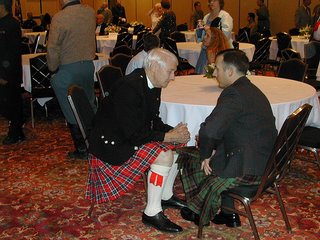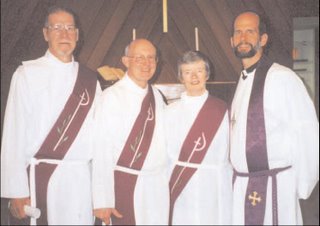[
Note:
I apologize in advance for the length of this piece. I know it could probably be more concise, but I believe there is simply a lot to say, so I'm just going to say it. Much of my thinking on this is still a work in progress. Thanks in advance for your patience! - Fr. H.]I know you are, but what am I?I'm not a big fan of labels. Too often they get in the way of real dialogue. Person A says: "I believe such and such." Person B says: "Oh, so you're a [fill in the blank]." Meaningful discussion ends, either in silence, or in a fight peppered with namecalling and
ad hominem attacks.
American Lutheranism is awash with factions that rally around labels, complete with political lobbying organizations, websites, e-mail lists, newsletters, and lists of candidates to vote for in church conventions.
On the one hand, I'd like to trash all the labels. However, there can be a salutary use of labels - so long as they are truly used to describe beliefs and not simply as short-cuts around deep thought and engagement of ideas.
Many of us Lutherans who see ourselves as defined by our sixteenth century confessions, as in submission to the inerrant Holy Bible, as wedded to the traditional liturgy (conducted with reverence and dignity), as a catholic continuity from the ancient and medieval Church, focused on God's monergistic justifying grace that works through specific humble means (the Word of God and the holy sacraments) to deliver Jesus Christ crucified to us physically and bodily - are described by certain terminology.
We are labelled by our detractors with such epithets as: liturgical nazis, blackshirts, stuffed-shirt Lutherans, Romanizers, Orthophiles, dead-orthodox, speed bumps, etc. We are accused of being unloving, legalistic, not mission-minded, lacking a heart for Jesus and the lost, and being a cult of purity. On the other hand, the labels we typically use to describe ourselves and our understanding of the faith include "conservative" and "confessional."
Both of these are, in and of themselves, fine terms. I would (and sometimes do) label myself as both. I'm a theological conservative, as I don't believe in change for change' s sake. Change must be truly warranted, and then must move at a glacial pace, and always consider the catholicity of the Church. Theological conservatism stands up for a view of Scriptural inerrancy over and against liberal methods of reading the Bible (such as higher criticism). Conservatism is opposed to left-wing and anti-biblical trends such as feminism and the homosexual agenda. I'm all for this kind of conservatism.
I can identify with the "conservative" label, but I think it hardly tells the whole story. For there are very conservative churches (who don't ordain women and uphold biblical inerrancy) whose worship practices include walkabout wise-cracking pastors with metal studs and bawbles in their faces, big screens, guitars, drums, and people waving their arms about in a rock-concert frenzy. There are also liturgical conservatives who piously limit their communion services (never using the term "Mass" of course) to once or twice a month (I suppose whether they need it or not...). I don't identify with these kinds of conservatism.
Then there is the label "confessional." This one is more sticky. For technically speaking, all Lutherans are by definition confessional (binding themselves to the Lutheran confessions in the Book of Concord of 1580). Therefore, when a faction of Lutherans describes itself as being "confessional Lutheran," the other side takes umbrage, perceiving an insult (which in fact, it may be). Some district presidents have banned the term's use in their districts, threatening groups that identify themselves using the adjective "confessional" with expulsion from synod.
Confessional refers to restoring the Book of Concord to its normative position in our churches' doctrine and practice, blowing off the dust, and actually reading and studying the confessions. And I'm all for that. Hence I can identify with the label "confessional" as well. But once again, there are difficulties with this word too. Many "confessional" Lutherans (self-described) embrace practices I disagree with, like teaching receptionism (the belief that the communion elements only become the body and blood of Jesus when they hit the believers' tongues). Some confessional Lutherans also pitch the leftover blood of Jesus into the garbage (especially if they use the disposable jiggers). There are confessional churches who only define themselves over and against Roman Catholicism, who believe that ordination is only a quaint ritual that does nothing, who are content with Puritanical sanctuaries and Methodist vestments. I find myself alienated from many confessional Lutherans as well - whose interpretation of those confessions is done in a historical vacuum.
Some other term is needed.
Losing My Tradition
A few weeks ago, my wife and I spent some time in Columbia, SC visiting friends. We stayed with a continuing Anglican friend who is studying for holy orders, and met a couple of clergymen from his diocese - true gentlemen and churchmen in the finest sense of those words. We also had a nice visit with one of our friends who is a political science professor at the University of South Carolina. He and his family are delightful people who have turned their suburban yard into a functioning vegetable garden. They are proponents of the Catholic Land Movement (as espoused by Chesterton and Belloc), valuing independence, modest living, stay at home mothering, limiting consumption, etc. In visiting with my two sets of friends (who don't know one another), the same terms came up again and again in conversation: tradition, traditional, traditionalism, and traditionalist.
Yes, they would all consider themselves conservative (although that term has largely become synonymous with a narrow political agenda that not all true conservatives support in its entirety), as well as "confessional" in the sense of being guided by a specific confession, historic writings that serve as a basis of their beliefs. But such terminology doesn't go far enough to describe what they believe. I realized that while I could describe myself as a conservative, confessional, Lutheran, the term that more accurately describes the "movement" within Lutheranism that I find myself and my colleagues involved in is "Traditionalism."
"Tradition" is a Latin translation of the Greek term "paradidomi" - which means "handing over." St. Paul uses this word in two different ways in 1 Corinthians 11:23-25 when he writes:
For I received from the Lord that which I also delivered ["handed over"] to you: that the Lord Jesus on the same night in which He was betrayed ["handed over"] took bread, and when He had given thanks, He broke it and said, 'Take, eat; this is my body which is broken for you; do this in remembrance of Me." In the same manner He also took the cup after supper, saying, "This cup is the new covenant in My blood. This do, as often as you drink it, in remembrance of Me."Thus Jesus was "handed over" ("traditioned") to his enemies, and the Words of Jesus were "handed over" ("traditioned") to the apostles, and through them, to the Church. These words were "traditioned" by word of mouth even before they had been "scriptured" (committed to writing).
Thus the Church lives and breathes through tradition, through the eucharistic Supper, through God's Word that has been "traditioned" to us from ancient times, through the proclamation of the Gospel that has been "traditioned" to us from a chain of pastors reaching back to the apostles.
Many Lutherans have a bad taste in their mouths regarding tradition, which dates back to the Reformation's insistence that God's Word in Scripture trumps doctrine that can only be found in oral narratives under the rubric "tradition." Fair enough. There were plenty of superstitions and fairy tales that masqueraded as tradition, and they needed to be excised (just as Jesus criticized false Scripture-usurping tradition in His preaching). And yet, is it necessary to throw the baby out with the bathwater as many of our Protestant (and conservative Lutheran) brethren contend?
Furthermore, culturally speaking, since the 1960s, the generation of Americans known as "baby-boomers" have sought to make tradition extinct. The past was seen as crippling, stifling, and worst of all "boring." Change became a mantra, ancient ways were discarded, and untried and experiental arrangements were being tried in every area of culture: music, literary symbolism, politics, family life, sexual mores, and of course, religious belief. This jettison of tradition promised great things: a new age of freedom, happiness, as well as personal fulfillment and empowerment (of course, instead it has left a swath of divorce, abortion, disease, dysfunction, and a sense of disconnect and ennui that has created unprecedented demands for psychotropic drugs in order to "cope" with the "fruits" of this new culture).
Different churches took different approaches to the Age of Aquarius onslaught. Some stanchly defended tradition and the "old ways," others quickly capitulated and embraced rapid change, still others simply made incremental changes over many years until now, some forty years later, they have largely implemented the 1960s purge of tradition without noticing it. The "conservative" and "confessional" Lutheran Church - Missouri Synod has taken the latter path.
Dragging its feet against these radical cultural trends, the LCMS has slowly and grudgingly traded its traditions for modernity. Bit by bit, she has capitulated to the Woodstock philosophy. She gradually extended the role of women to the point now where she, like most Protestant "denominations" and Vatican II Roman Catholics, endorse women's suffrage, representation in synods, chairing of boards, serving as "elders" and presidents of congregations, readers, acolytes, and communion assistants. Women serve in various roles as "commisioned ministers" and chaplains, and may now even teach seminary classes. After much wrangling, the LCMS has given the green light to participation in public services with Hindus, Muslims, Jews, and Sikhs (such "ecumenism" is not at all uncommon among American Roman Catholics). Much of the literature coming out of St. Louis pushes for further modernization and change in the LCMS culture so as to address changing demographics in the U.S. and abroad.
And yet, in the face of this constant push for change, the LCMS maintains an image of staunch conservatism!
Running many years behind the trendsetters, the LCMS has taken on the worst of both worlds, creating an ugly hybrid between a purely traditional and a purely modern approach, creating a Frankenstein monster hacked together with many different corpses - while trying to appeal to both traditionalists and those who reject tradition.
This is best illustrated by our worship practices.
How many of our churches offer "contemporary" worship, "traditional" worship, and "blended" worship"? Unlike Jesus who was observed to do all things well, we seem to do all things poorly. Our synod's "contemporary" worship tries to wed traditional substance and anti-traditional style - creating a trainwreck of hypocrisy and the attempt to send two antithetical messages at the same time. It has degenerated into a doctrinal muddle that emphasizes entertainment at the expense of the Gospel. Our "traditional" worship (which has largely been marginalized into the ghetto of the earliest possible hour for worship) is typically butchered and conducted so poorly that one wonders if the pastors have ever learned the rubrics for the conduct of the service, read any books at all about the theology and practice of worship, or if they have a clue what all of the symbolism in the liturgy means. And our "blended" services are, in my opinion, really nothing more than a "hegelian dialectic" designed to abolish the so-called traditional service all together - for if we blend "contemporary" and "traditional" enough, a new third option will eventually replace the other two entirely, and what little liturgical tradition we have will be lost.
And when the salt has lost its savor...While many of the younger generation of pastors are better versed in the church's traditions and there is a budding trend among the laity for a return to reverence and a connection to the past, more than half of our congregations now have some kind of "contemporary" worship. Even among our liturgical congregations very little is left of tradition. How many LCMS congregations make use of full eucharistic vestments, incense, and bells at Divine Service? How many LCMS congregations have regular times for private confession, and how many of our members regularly take advantage of this sacrament? How many of our pastors and laity make use of traditional prayer offices during the week? How many of our bible classes bring the rich history of the church into discussion? How many of our churches are comfortable with traditional terminology such as "Mass" and "Catholic"? How many of our churches serve the blood of Christ in a respectful, traditional common chalice as opposed to Protestant, individualistic "shooters" (some of which are designed to go into the trash when done)? How many of our pastors are willing to genuflect at the high altar, or elevate the holy elements for adoration?
In fact, I know of pastors who are inhibited from even pronouncing absolution ("too Catholic" - read: "too traditional")! Many of our churches are scandalized when the pastor attempts to give the holy body and blood of the Lord every Sunday ("too Catholic") - as our confesions clearly state that we are bound to do. And you can just imagine the outcry if the typical LCMS pastor were to lobby to restore the traditional chalice and replace the shot-glasses, or to (re)introduce incense. Even the vast majority of the most staunch conservative, confessional churches would certainly form a lynch mob to remove the pastor for such actions.
In fairness, they would see these as "changes" instead of a healthy return to tradition, actually a rejection of modernist changes largely from the 20th century. Many are so severed from tradition themselves that they think of traditional Lutheran hymns as "new" while embracing the maudlin (and in some cases heretical) "old favorites" from the 19th century. Obviously, a wise pastor will procede slowly catechize his flock before restoring traditions, and will procede in love, charity, and a concern for fragile souls. A faithful traditionalist pastor may toil for decades and never live to see the Mass restored to every Sunday in his "conservative" and "confessional" parish.
But in the LCMS' untraditional congregational/democratic polity, the shepherd had better not try to lead his flock, lest the flock treat him as a hireling and dictate the "policy" to him, or even fire him. The conversion of the sheep into bishops and the bureaucratic definition of the pastor as a "professional church worker" is yet another downside of casting off tradition (democracy is part of the anti-traditional movement, it is not for nothing that the dollar bill contains the Roman numeral XDCCLXXVI and the Latin term: "novus ordo seclorum" - let the reader understand). This is less likely to occur in traditional churches that maintain traditional polity and use the traditional appellation "Father" to address the pastor.
The Baby Boomers' Worst Nightmare: Back to the FutureThere is a phenomenon that is frighteneing to the aging wearers of tie-dye who now hold the reins of power in church and state. There is a move back toward tradition, a backlash against the libertine 1960s culture that left a generation of people bereft of the comforts of the past.
Look around! You see it in both church and secular society, across denominational and philosophical lines. Young Roman Catholic priests (as well as some Lutherans) have rejected the casual "golf shirt and khakis" look that sought to blend in, and are returning to the traditional black cassock. There are nuns who are restoring the traditional habit (over and against the aging hippy nuns who wear T-shirts and jeans). There are even some Baptist and non-denominational clergy who are wearing clerical collars, and in some cases, cassocks! And let's not fail to consider the Roman Church's recently-elected pontiff!
As Bob Dylan sang back in the early 60s, "the times they are a-changin'."
There is the home-school movement, the stay-at-home mothering (and antifeminist)movement, the Catholic Land Movement, and the growth in popularity of
Higher Things magazine and its more traditional youth conferences (a truly Lutheran alternative to the disturbing LCMS youth gatherings). There is a traditionalist movement within American Lutheranism manifested by publications like
Gottesdienst and
Bride of Christ, as well as religious societies such as the Society of the Holy Trinity (which is very traditional with the tragic exception of its embrace of female "pastors") and its all-male counterpart, the Society of St. Polycarp.
Though still a tiny minority within the LCMS, one is more likely to find a "high church" congregation, to hear traditional terminology in the congregation, and to find pastors teaching the Lutheran confessions alongside the early church fathers now than at any time in recent history. It is not uncommon to hear the officially sanctioned prayers that are published by the LCMS Commission on Worship use the term "catholic." There are more Lutheran schools moving toward a classical model and incorporating traditional rhetoric and Latin back into their curricula.
Quo Vadis?It will be interesting to see what happens as baby-boomers become less of a factor in the LCMS. The aging Charismatic group "RIM" has already had to disband, citing a lack of younger leadership. Both seminaries continue to turn out younger pastors who are not merely "conservative" or "confessional" - but also "traditional." It seems that more district presidents have been recently elected who are (hopefully) at least more tolerant of traditionalism than the "old guard."
On the other hand, the Viagra- and Botox-fueled baby-boomers as a rule have proven tenacious and most unwilling to yield power to their younger counterparts who, unlike them, do not see the 1960s as a "golden age," whose traditionalist ways are considered a scandalous "turning back of the clock." I don't believe we have seen the last of traditionalist pastors being shafted by the hierarchy, nor can we expect non-traditional congregations to welcome traditionalist pastors with open arms. There is still plenty of struggle ahead, and traditionalist pastors must be patient, pastoral, and loving with their congregants even as they must be firm with meddling bureaucrats, steadfast in the holy faith, and submissive to our Lord Jesus Christ.
Hopefully, we will not see a continued loss of traditionalist pastors to the Eastern Orthodox and/or Roman Catholic churches. It has been heartbreaking to see some of our brightest and best theologians, some of our most pastoral servants of the Church, flee to other communions. Make no mistake, they are being driven away by
Ablaze!, Jesus First, synodical shenanigans, feminism, lay ministers, DELTO, irreverent worship, defining the ministry as a "profession," low-church "conservatism," and democratic polity - in short, by the LCMS's anti-traditionalism. Though I suspect most LCMS lay people are unaware, there has been a bloodletting of traditionalist pastors and laymen who have either been run off, or who have given up on the LCMS and left. It is my prayer that this hemorrhage is at an end, that the trend toward traditionalism (along with institutions like the Society of St. Polycarp,
Gottesdienst, and various blogsites that promote and espouse traditionalism) will bolster weary pastors who are fed up with gimmicks and corporate cheerleading masqerading as church, who seek a church that looks and acts like a Church rather than a "branch office" of a "corporation."
Will the LCMS continue to be tossed about by the waves of fads, thrown hither and yon by the whims of modernism and postmodernism? Or will the boomer culture shrivel and die, and yield to a return to tradition and a rejection of the experimentation and hubris of the bell-bottomed generation? Will we find ourselves hopelessly lost, mired in postmodernism and liberalism like the Episcopalian Church, or will we, like the continuing Anglicans, heirs of the traditionalist Oxford Movement, rediscover the facets of our own catholicity and tradition that allow the Gospel's light to reflect from our Church, the dazzling light that finds its source in Jesus, the Light of the World, Himself?
Only time will tell. Meanwhile, traditionalist pastors and laymen (of both sexes), take heart! Be loving but bold. Be patient, but firm. Pray fervently for a restoration of traditional piety in our synod, and if it is not to be in our synod, in American Lutheranism whatever shape it may take in the future. Pray also for non-Lutherans who are likewise struggling to uphold traditional Christianity in the face of feminism, the homosexual agenda, indifference toward the sacraments, and a postmodern worldview that denies the divinity (or the humanity) of Jesus. Support traditional pastors and congregations, as well as journals like
Gottesdienst and
Bride of Christ.
Don't expect the solution to lie in politics, but rather in repentence, humility, prayer, the grace given to us at Baptism, and a faith found and nourished at the confessional and the communion rail. Remember, we dare not fall into the anti-traditionalist and modernist trap that this is all about us. It isn't. As G.K. Chesterton wrote: “Tradition means giving votes to the most obscure of all classes, our ancestors. It is the democracy of the dead. Tradition refuses to submit to that arrogant oligarchy who merely happen to be walking around.”
Amen!
 The following article from Ladies Against Feminism really made me start to question whether it is in the best interests of women, especially Christian women, to engage in competitive sports.
The following article from Ladies Against Feminism really made me start to question whether it is in the best interests of women, especially Christian women, to engage in competitive sports.








